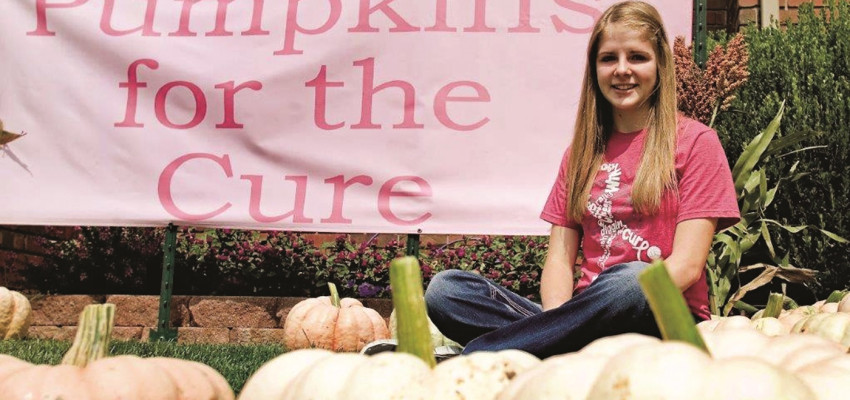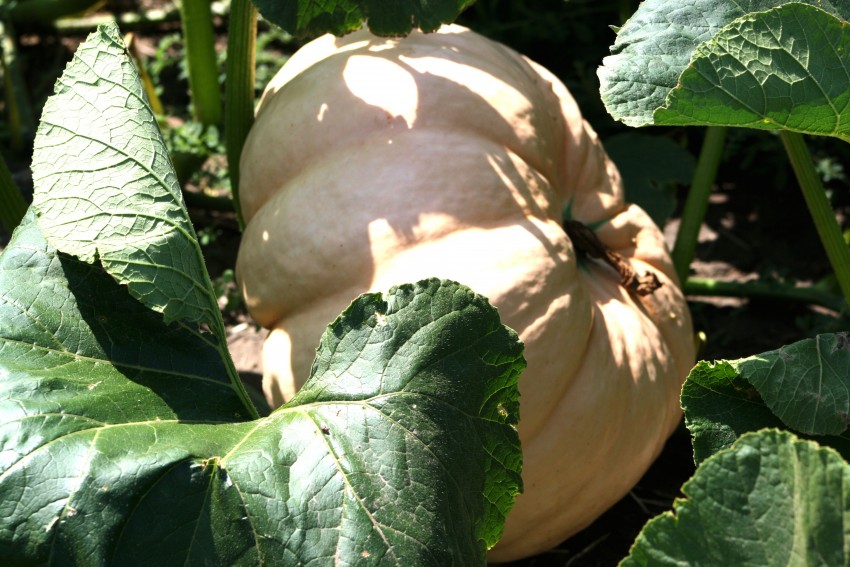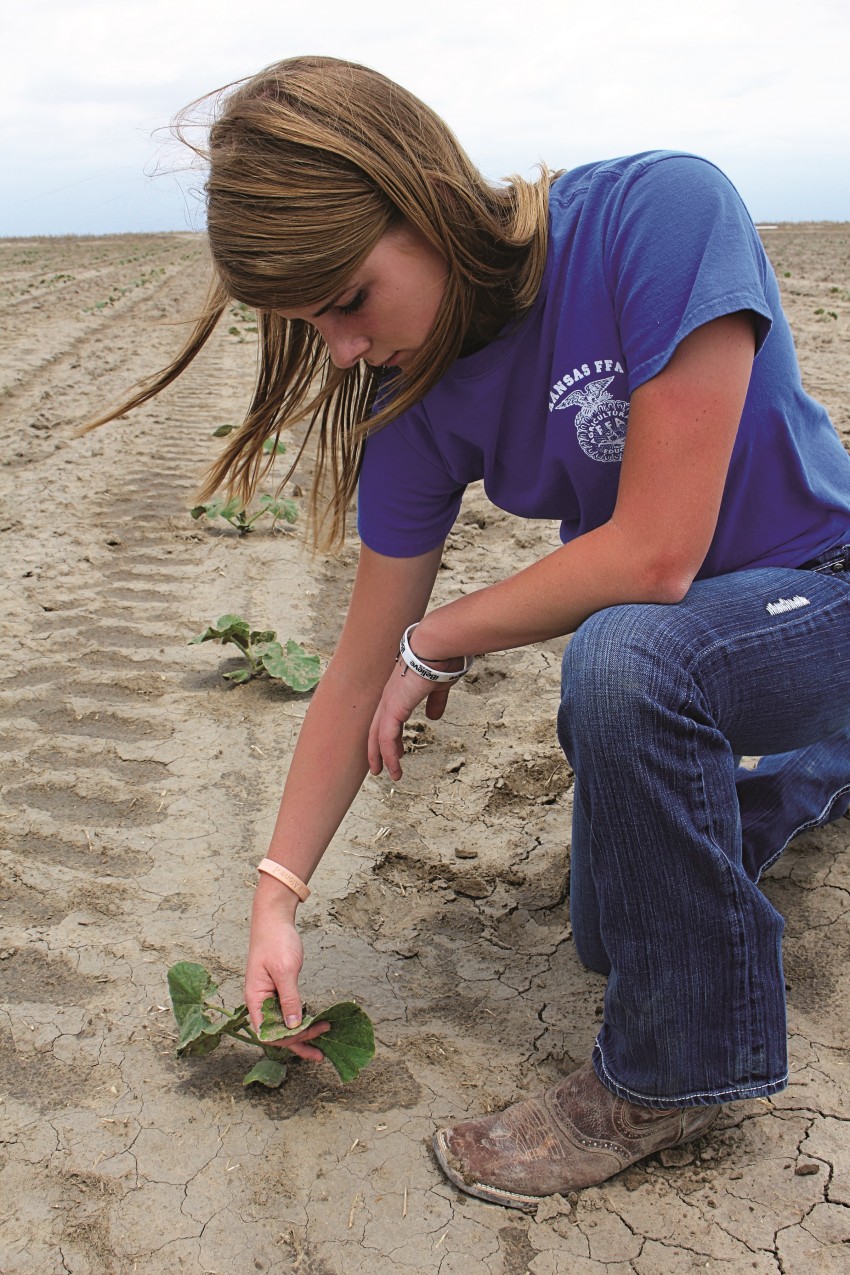By John Schlageck on August 15, 2014
Growing for Good

Sixteen-year-old Maggie Roth of Holcomb latched onto the idea of growing pink pumpkins to promote breast cancer awareness in 2013, when she was a sophomore member of the Holcomb FFA chapter.
Growing pink pumpkins seemed like a logical step for Maggie, whose father Dwane has raised conventional, orange pumpkins for 27 years.
Every fall he invites kids from Holcomb to his traditional pumpkin patch for Halloween. He also donates pumpkins to churches, the Finney County Library, the local zoo and his daughter, Grace’s, 4-H club who sells the pumpkins and uses the funds to help local families in need.
As a dedicated, long-time FFA leader, Maggie decided to participate 100 percent in the Pink Pumpkin Patch Foundation while following the FFA motto learning to do, doing to learn, earning to live, living to serve. She figured if this foundation inspired her, it would do the same for many of her fellow FFA members.
“I believe at some point in life, everyone is impacted by cancer,” Maggie says. “It could be a family member, friend, a friend of a friend or even yourself.”
 The Pink Pumpkin Patch Foundation originated in 2012 with Carol and David Froese, who own Colorado Seeds Inc. in Cheraw, Colo. Carol was a breast cancer survivor and accidentally discovered a pink pumpkin in the field. The seed for pink pumpkins to promote breast cancer awareness was planted that very day and the rest is history.
The Pink Pumpkin Patch Foundation originated in 2012 with Carol and David Froese, who own Colorado Seeds Inc. in Cheraw, Colo. Carol was a breast cancer survivor and accidentally discovered a pink pumpkin in the field. The seed for pink pumpkins to promote breast cancer awareness was planted that very day and the rest is history.
Growers agree to give proceeds from the sale of pink pumpkins to the foundation, which in turn awards grants to research organizations.
Maggie began by contacting the foundation’s president about involving FFA chapters in her region of Kansas. Plans for acquiring seeds were worked out and Maggie contacted other FFA chapters about growing pink pumpkins for cancer.
To date 43 FFA chapters across the country are involved in the Pink Pumpkin Patch Foundation. Each chapter can set its own prices. Maggie’s Holcomb chapter sells the pumpkins for $10 apiece; 100 percent of the proceeds go to the foundation.
In 2013, the Roths raised several thousand pumpkins on their three-acre plot. Proceeds from their pumpkins totaled $28,500.
But money isn’t the only benefit of the pumpkin project. It’s become a community event and people can’t seem to give enough.
“That’s the real beauty of this project,” Dwane says. “People throughout our community give of their time, services and money to help our pumpkins succeed.”
A local aerial applicator provided pesticides and application at no cost. Pumpkin seeds are free from SeedWay and the Garden City Coop and CoBank, an ag bank in Denver, donated several thousand dollars each.
“People believe in the Pink Pumpkin Patch Foundation. As my daughter will tell you, it helps teach kids the value of life. This is about saving human lives. At the end of the day, our children are helping care for others. What could be more worthwhile?”
— Dwane Roth
 With the help of her dad, Maggie plants the pumpkins with a planter she’s also painted pink. While they grow, she marks plants throughout the 3-acre plot and shoots photos several times a week.
With the help of her dad, Maggie plants the pumpkins with a planter she’s also painted pink. While they grow, she marks plants throughout the 3-acre plot and shoots photos several times a week.
Porcelain Doll is the pumpkin variety grown on the Roth farm. When mature they range in weight from 15 to 20 pounds and are edible. The outer skin is much thicker and tougher than the more traditional, orange pumpkins, Maggie explains. They’re also heavier.
“Porcelain Dolls taste sweeter than the average pumpkin,” she adds. “Some of them are so beautiful, especially the pink, pink ones. No two pumpkins are ever the same.”
The Roth family enjoys giving from the bounty of their land. There’s a lot of satisfaction in seeing school children swarming through their field looking for that perfect pumpkin.
“It’s a really big deal for these kids from town and Garden City to go out in the field and pick their own pumpkin,” Maggie says. “All you have to do is look at the big smiles on their faces as they pack the pumpkins out to their cars.”
This fall the Roths plan to haul some of their pumpkins to Wichita to sell. As for Maggie, she’s not quitting any time soon. By her senior year, she hopes to enlist every state in the union in the Pink Pumpkin Foundation.
The Finney County 16-year-old isn’t sure what her vocation for the future might be; however, she intends to continue working with the foundation after she graduates from high school.
“This experience has taught me how much service touches other people,” Maggie says. “I’ve also learned a lot about myself at the same time.”
Porcelain Doll: The Perfect Pink Pumpkin
The Pink Pumpkin Patch Foundation began in 2012 to aid in the fight against breast cancer. Pumpkin growers across the United States remain committed to giving a percentage of proceeds from every pink pumpkin sold to the foundation. In turn the foundation awards grants to breast cancer research organizations. Characteristics of pink pumpkins include:
- Maturity for Porcelain Dolls averages about 120 days. Harvest indicator is a corky stem.
- Average weight is 10 to 20 pounds.
- Seeding rate is between 1,800 to 2,000 per acre.
- Immature fruit starts out pale yellow, turning buff or cream, with true pink color achieved at maturity.
- Multiple harvests are required to maximize fully mature pink fruit.
The Pink Pumpkin Patch Foundation’s commitment to research continues. The foundation requires a grower agreement acknowledging the grower’s commitment to make a donation of 25 cents per pumpkin sold to fund breast cancer research projects. 4H and FFA organizations are asked to donate 50 percent of their proceeds to the foundation.


